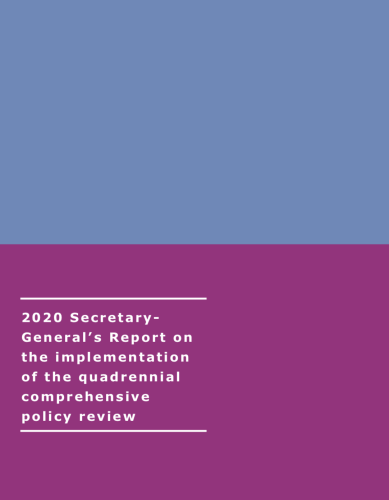2020 Secretary General’s Report on the implementation of the QCPR

In line with the mandates contained in resolutions 71/243 and 72/279, the present report provides a thorough update on the implementation of the 2016 QCPR and the reforms of the UN development system.
Drawing on the latest data and a number of surveys from UN-DESA, the report demonstrates that the UNDS reforms are consolidating. The UNDS is better positioned and ready to accompany countries as they seek to respond to the COVID-19 pandemic and accelerate SDG implementation. The reinvigorated Resident Coordinator system is now firmly in place ensuring stronger and independent leadership of the UNDS at country level. A new generation of UN Country Teams, more cohesive and responsive to national needs and priorities, is taking shape. Solid foundations have been built to nurture a culture of results and learning; and to improve efficiencies in business operations. Challenges remain however and continued effort is needed to ensure further consolidation through ongoing leadership from all involved, sustained funding of the RC system, strengthened capacity on system-wide evaluations; and improved implementation of the funding compact.
The report also outlines a proposed way forward on three outstanding repositioning components. A final package of measures are provided to strengthen our support to MCOs – a historic deficit in our UN development offer to these countries. A clear differentiated approach is set out to optimize the rich array of policy assets at the regional level, both to tackle cross-border issues and to strengthen the capacities of our country teams to respond to country needs. Member State consideration is also required of the system-wide strategy document.
Finally, to inform the development of the next QCPR later this year, the report addresses a number of issues that go to the core of the integrated support that member states expect of the UNDS to recover better from the current crisis and deliver during the Decade of Action. The UNDS will need to support governments with policy options and technical advice to make difficult choices. It will need to sharpen its offer on critical priorities such as poverty eradication, climate change, and sustainable economic growth. And it will need to strengthen its ability to work with other partners including in some of the most difficult contexts.













